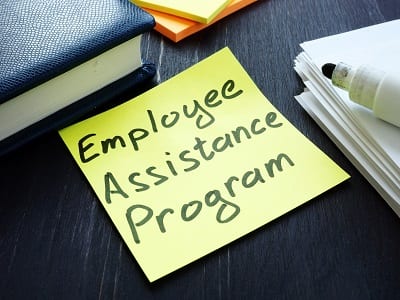Many employers offer Employee Assistance Programs (EAP) to provide free and confidential counseling services for employees experiencing personal problems. Employee problems may be related to work, relationships, health concerns, financial or legal issues, substance abuse, depression, or other issues.
The employer pays for EAP services, often in conjunction with health insurance plan benefits. Even though the employer is paying for the service, the program remains completely confidential, meaning the employer does not receive any information about how or why an employee is using the services.
The Health Insurance Portability and Accountability Act (HIPPA) mandates the confidentiality of such services. The only exception to confidentiality is if the EAP counselor believes a person is at risk of harming themselves or others. In such cases, the counselor may be required to report the situation to local authorities.
Why Does My Employer Offer an EAP?
Because personal problems can adversely impact a person’s work performance, it is in an employer’s best interest to provide services to help employees resolve personal and work-related problems safely and efficiently. Through an EAP, employees get the help and direction they need, while employers benefit from less absenteeism, improved productivity, and increased employee retention.
Stress can have a devastating effect on a person’s physical and mental health, decreasing their ability to focus and function optimally. Employers find that when employees work with EAP counselors to better manage stress, job-related accidents often decrease and performance improves.
How an EAP Can Help
Your company’s EAP counselors are trained to help you explore issues that are negatively affecting your personal life and work performance and to connect you with the resources you need to improve the situation. These issues can include work-related stress, but can also touch on challenges including addiction, substance use, and mental health concerns.
EAPs provide services for employees for challenges including:
- Workplace conflict. How to resolve differences with supervisors or co-workers.
- Job burnout. Connect with career resources, training, and educational options.
- Mental health problems. Personal or loved one’s anxiety, depression, anger, grief, or other mental health challenges.
- Crisis Management. Resources to aid in recovery from a natural disaster or other major life disruptions.
- Family problems. Marital issues, domestic abuse, problems with children, and other family problems.
- Caregiving problems. Eldercare or childcare, a loved one’s disability, or other caregiving issues.
- Substance abuse. Personal or loved one’s drug, alcohol, or other addictive behavior.
- Legal or financial problems. Resources and referrals for help. Some EAPs refer to free or low-cost legal aid.
COVID-19 is an ongoing source of unusual stress for millions of people around the globe. Many companies are encouraging employees to contact their EAP at any time of the day or night for help with COVID-related stress, fear, anxiety, substance use, and other mental health issues. EAP counselors are trained to help in these unusual times.
Benefits of an EAP include:
- Immediate help in crisis situations, including a 24-hour hotline staffed by trained counselors
- In non-crisis situations, the first counseling session can be scheduled within a few days
- No cost to the employee for EAP services
- Licensed, professional counselors
- Sessions take place off-site in private spaces (or, in many cases, virtually)
- Many programs allow the employee’s spouse or partner to access support services
Can I Refer Myself to My Company EAP?
You can contact your EAP directly by phone, email, or online. Your employee handbook or company website should provide the contact information for the program, including a 24/7 crisis hotline number if available.
In other cases, a supervisor, manager, or HR professional may suggest you contact the EAP. They may suspect personal issues are affecting your work performance and believe EAP services can be of help. Sometimes, your supervisor or HR professional may refer you to your EAP because of negative performance evaluations, a disciplinary issue, or serious infractions of company policy.
Accessing EAP services is voluntary. However, if you have expressed a threat about harming yourself or another or threatened other workplace violence, your employer may insist you see an EAP counselor. It should be noted that if an employer mandates an employee to use EAP services, the employer may face legal challenges under the Americans with Disabilities Act (ADA).
Scope of Services Offered by Most EAPs
EAPs do not offer long-term counseling services. Typically, you will receive one to three sessions at no cost to you. Counselors use the sessions to evaluate your situation and to provide short-term counseling, helping you to better understand the issues underlying your problem and guiding you in techniques and solutions for managing the issue.
EAP counselors will then recommend follow-up services, which may include referral to a therapist or another professional and other resources or services. If the EAP counselor refers you to a professional outside the program, you will be responsible for any costs not covered by your insurance company.
It is increasingly common for EAP professionals to assist employers in addressing such issues as workplace violence and other emergency response situations. Counselors may offer educational programs for employees, helping them recognize anger management issues and other behaviors that could escalate to violence.
In crisis situations, such as workplace violence, EAP counselors often provide on-site crisis intervention and counseling services for traumatized employees. Some EAPs work with companies to develop a formal emergency-response plan.
It is important to understand that EAPs evaluate your situation, provide short-term counseling, and refer you to another professional if appropriate. EAPs counselors do not diagnose a health condition or provide long-term psychotherapy.
If you’re struggling with stress, burnout, personal challenges, or substance use and addiction concerns, turning to your company’s EAP can be a helpful first step.
Turning Point of Tampa has offered Licensed Residential Treatment for Addiction, Eating Disorders and Dual Diagnosis in Tampa since 1987.



